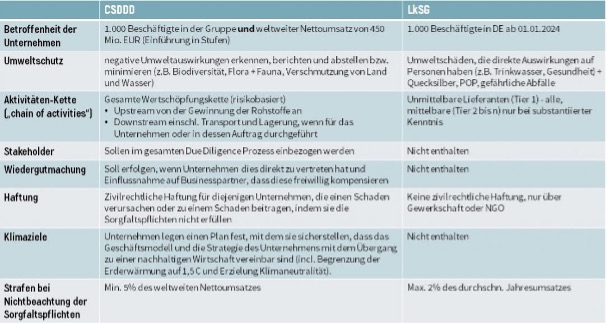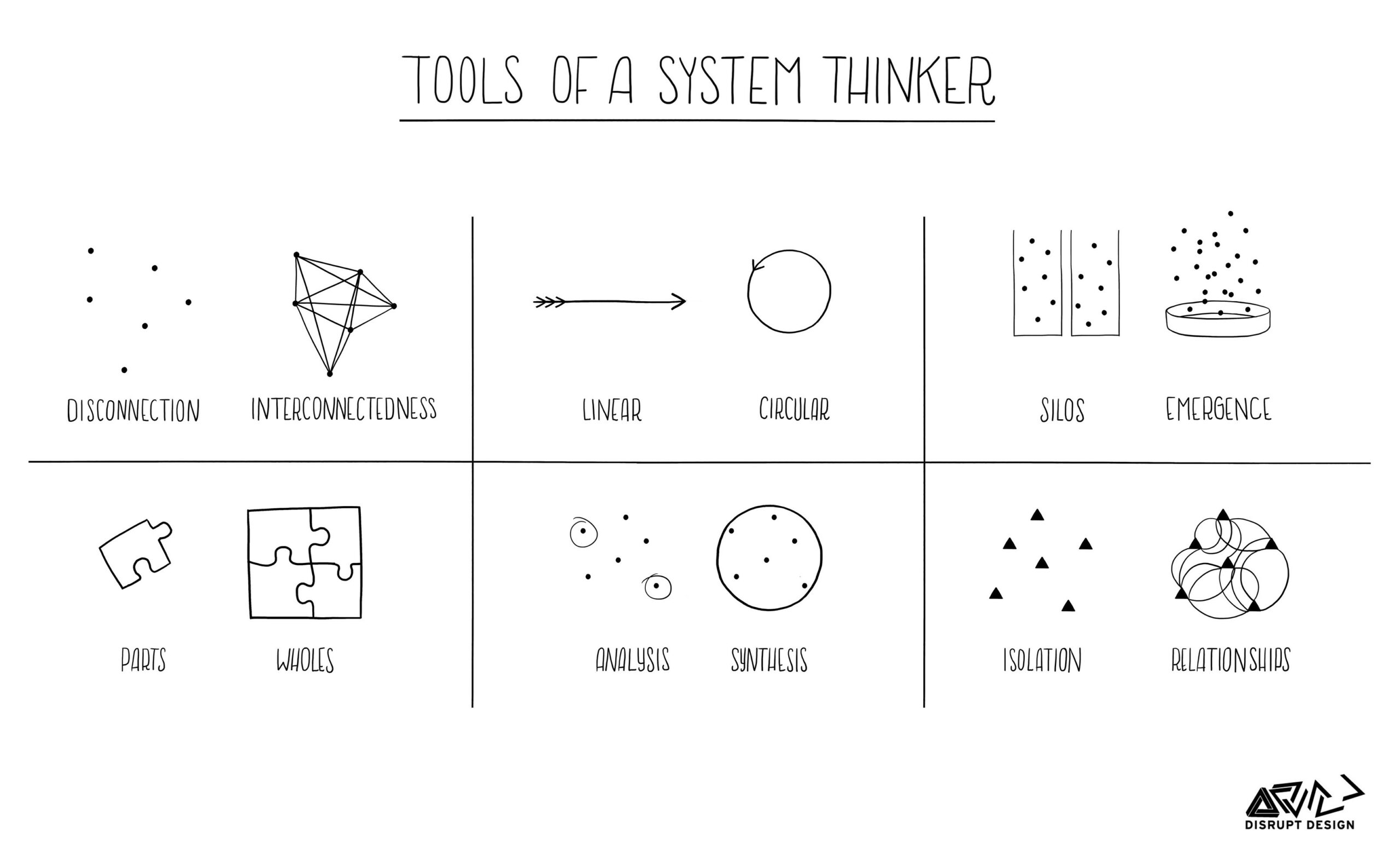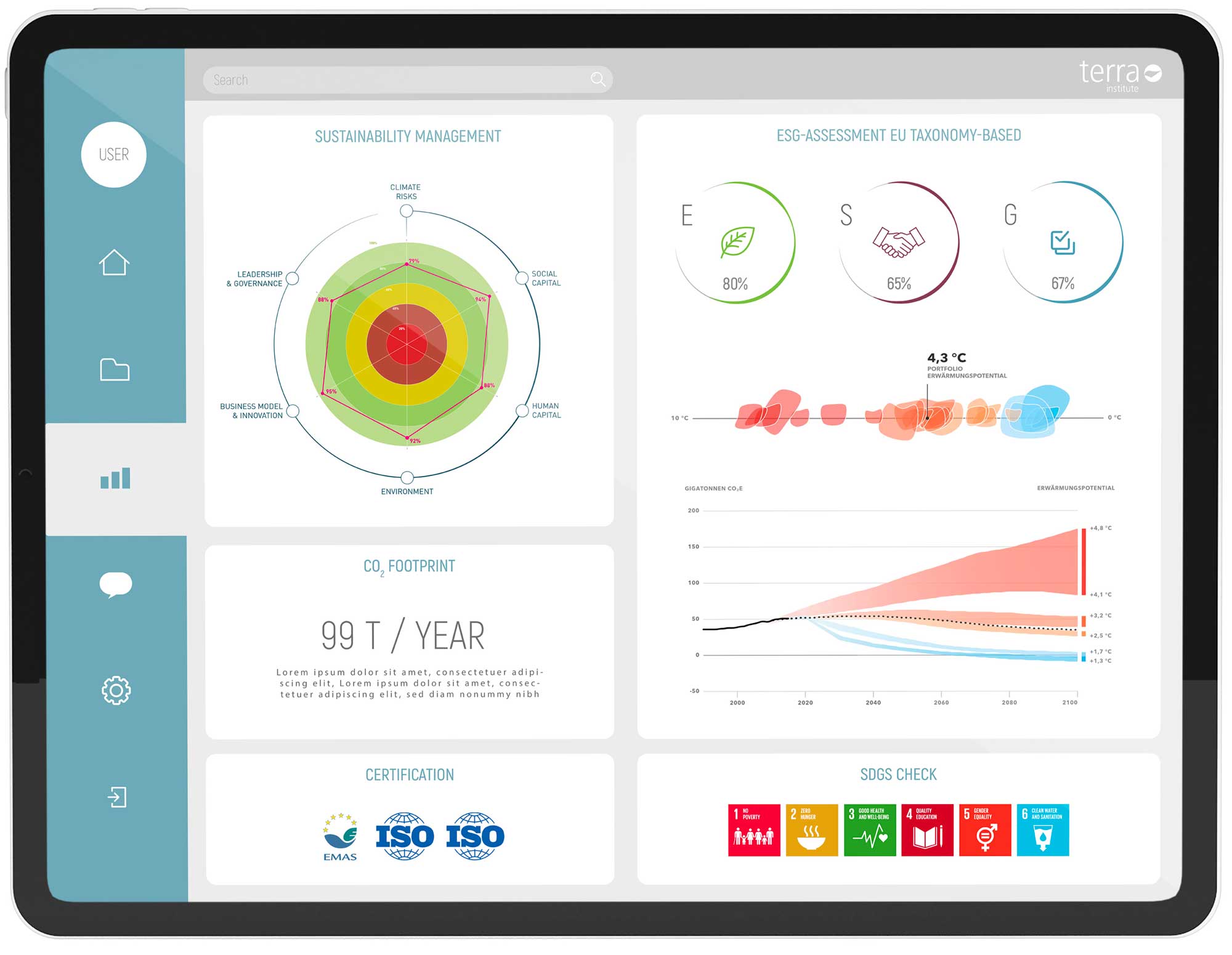COMPARISON BETWEEN THE EU DIRECTIVE ON SUSTAINABLE CORPORATE GOVERNANCE (CSDDD) AND THE GERMAN SUPPLY CHAIN DUE DILIGENCE ACT (LKSG)
In today’s globalised world, companies are under increasing pressure to make their supply chains more sustainable and ethical. Two important sets of regulations dedicated to this topic are the EU Sustainable Corporate Governance Directive (CSDDD) and the German Supply Chain Duty of Care Act (LkSG). With the adoption of the CSDDD (Supply Chain Directive) in May, the LkSG will need to be revised over the next two years. This blog article highlights the similarities and differences between these two pieces of legislation with a focus on the new CSDDD and shows how companies are affected by the respective regulations.
OVERVIEW OF THE EU SUPPLY CHAIN DIRECTIVE
The EU Corporate Sustainability Due Diligence Directive (CSDDD), also known as the EU Supply Chain Directive, aims to hold companies accountable for upholding human rights and environmental standards in their global supply chains. It calls for these challenges to be recognised as transnational issues and tackled jointly and in a coordinated manner. Companies are obliged to fulfil certain due diligence obligations with the aim of avoiding, minimising or ending potential and actual human rights or environmental risks. This includes their own activities as well as those of their subsidiaries and business relationships.
As this is a directive and not a law, the member states must transpose the requirements into national law within two years. A three-year phase-in period is envisaged for companies:
- the largest companies (5,000 employees, €1.5bn turnover) by 2027,
- Companies with more than 3,000 employees and €900m turnover by 2028,
- Companies with more than 1,000 employees and €450m turnover by 2029.
CORE REQUIREMENTS OF THE EU SUPPLY CHAIN DIRECTIVE
- Integration of due diligence: Companies must integrate due diligence obligations into their internal guidelines and risk management systems.
- Employee involvement: The due diligence policy should be developed in consultation with employees and their representatives.
- Assessment and prioritisation of risks: Companies must identify human rights and environmental impacts based on their severity and likelihood of occurrence.
- Reporting and communication: There is an obligation to report annually on the due diligence measures implemented and their results.
OVERVIEW OF THE SUPPLY CHAIN LAW
The German Supply Chain Due Diligence Act (LkSG) came into force on 1 January 2023 and obliges large companies to fulfil human rights and environmental due diligence obligations along their supply chains. The law initially applied to companies with more than 3,000 employees, and from 2024 also to those with more than 1,000 employees.
CORE REQUIREMENTS OF THE SUPPLY CHAIN ACT
- Risk management: Companies must introduce an effective risk management system that ensures compliance with human rights and environmental standards.
- Risk analyses: Regular risk analyses to identify and assess risks in the supply chains are mandatory.
- Reporting: Annual reports on compliance with due diligence obligations and the measures taken are required.
COMPARISON OF THE TWO LEGISLATIONS
SIMILARITIES
Both the CSDDD and the LkSG aim to strengthen the responsibility of companies for human rights and the environment in their global supply chains. In addition, both sets of regulations require the implementation of risk management systems to identify and manage risks. The need for transparent reporting on the measures implemented and their impact is also emphasised in both regulations.
DIFFERENCES
Three topics stand out that are included in the CSDDD, whereas the LkSG does not cover these areas: stakeholders, redress/civil liability and climate targets. We therefore want to take a closer look at these.
Specifically, it is stipulated that stakeholders must be included in the entire due diligence process. This includes the company’s own activities, the activities of subsidiaries and the activities of business partners in the chain of activities. In the context of stakeholder dialogues, companies should conduct effective and continuous consultations at an appropriate level with their employees, the employees of their subsidiaries, trade unions, consumers and other affected groups. This process includes information gathering, the development of preventative and corrective measures, decisions on business relationships and remediation. Here we see parallels with other European laws, such as the CSRD, which also emphasises stakeholder consultations.
The second major difference relates to the handling of violations and the compensation of the resulting damage. In cases where companies’ activities have a negative impact on people, groups or the environment, the Supply Chain Directive (CSDDD) calls for compensation. This is intended to create a situation in which those affected would have found themselves if the harmful effect of the company had not occurred. At the same time, civil liability has also been included in the CSDDD. Victims and those affected can sue companies if they have intentionally or negligently failed to prevent or minimise risks or have not ended or reduced injuries and this has led to damage
The third innovation introduced by the CSDDD is the development and implementation of a climate transition plan by companies. This plan should ensure that the company’s business model and strategy are compatible with limiting global warming to 1.5°C in accordance with the Paris Agreement and the goal of climate neutrality. The plan should include:
- Time-bound targets to 2030 and in 5 year increments to 2050, based on scientific evidence and including absolute emission reduction targets for greenhouse gases where possible,
- decarbonisation measures,
- key actions to achieve the targets,
- investments, oversight and governance of the plan.
Progress will be monitored by regulators. Companies that already report on their climate transition plans under the CSRD are not required to prepare a new plan, but must update their plans annually.

SUMMARY AND OUTLOOK
The introduction and implementation of the CSDDD and the LkSG mark significant steps towards more responsible and sustainable corporate governance. While both pieces of legislation pursue similar objectives, they differ in their scope and specific requirements. Companies should take a close look at both sets of regulations to ensure that they fulfil their legal obligations while making a positive contribution to global sustainability.
The implementation of these due diligence obligations requires strategic adaptation of corporate processes, close cooperation with stakeholders and continuous monitoring and improvement of measures. This is the only way for companies to meet the growing expectations of legislators, customers and society while remaining successful in the long term.
How can you as a company prepare for the CSDDD? Find out more in this blog post. ‘Preparing for the new CSDDD’.
Our Terra Academy offers customisable training for you and your employees. You can find more information at academy.com or arrange a non-binding consultation with expert Sylvia Albrecht.

Sylvia Albrecht Senior Consultant and Team Lead Supply Chain.
With 20 years of experience in purchasing and procurement consulting, her focus is on sustainable procurement and the Supply Chain Act (LkSG, CSDDD). Through her many yearsof work in and with procurement, she knows the processes of sustainable supplier management and understands the value contribution that procurement can make to a sustainable corporate orientation. Sylvia is also leading our EcoVadis TrainingpartnersProgram.











